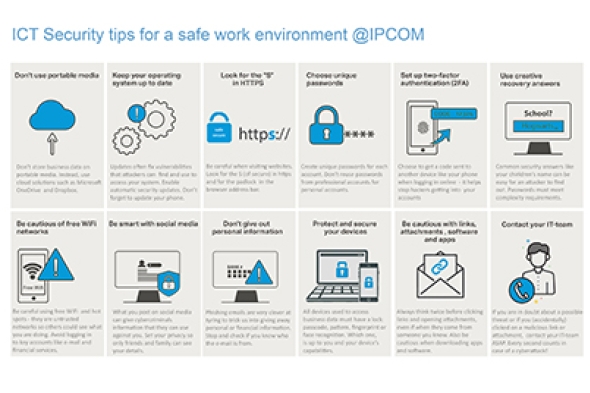Cybersecurity: a man forewarned is worth two
Cybersecurity strategy and action plan
IPCOM developed a cybersecurity strategy and action plan. The local IT teams will be working closely together with the IPCOM ICT Security Team to monitor, assess and mitigate the cybersecurity risks within their company. The goal is that each company in the group can improve its ICT security and protect its business data from falling into the hands of people who could use it in a way that would be detrimental for the business.

Cybersecurity awareness
Also you have a role to play. You are part of our online defense and need to be cautious every day. While there’s no bulletproof way to prevent an attack, there are a lot of things you can do that will help to lessen the risk. Click here to download some easy tips to help you to work safely and securely. It’s a visual poster that you can hang at a visible spot in the office, so you are reminded of these do’s and don’ts every day.
Smartphone
Be extra cautious with your smartphone. This is a hot target for cybercriminals for several reasons. It contains a lot of personal and confidential information and it can be accessed in several ways.
For example: People are constantly downloading apps and software, often free ones, and many times these not secure or trustworthy. In addition, people may have apps running on their phones in the background without even realizing it. This is a hidden gateway for hackers to gain entry to the phone. Also, upon download, apps may ask for the user’s permission to access various types of data on the phone or to carry out specific actions, such as accessing a contact list or phone camera. If the mobile user allows access for all requested permissions, this can create a gaping “hole” just waiting for hackers to enter, known as “data leakage.” To avoid data leakage, the mobile phone user should only allow the permissions absolutely necessary for the running of the app. Hackers can also use phishing and spam attacks to attempt to access mobile phone data.
How to prevent this?
Overall, with the same tips that are given in the attached poster. We just need to apply them everywhere and all the time because smartphones have become an inseparable part of our daily lives. So all it takes, is some extra attention.








